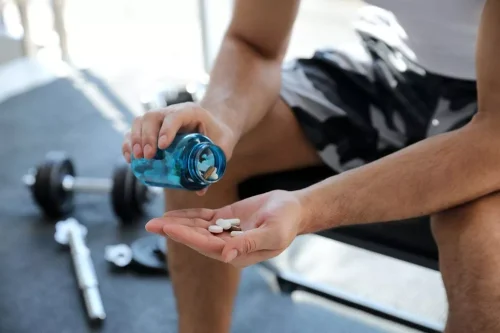By the numbers: Americas alcohol-related health problems rising fast

The mice were placed in a 30 × 54 cm plastic bin and left to explore for ten minutes. Two plastic objects were added to the bin, and the mice then explored the objects for ten minutes. Each treatment group was divided into three sub-groups that were given different sets of objects. 60 minutes after the learning phase, one of the objects was replaced https://ecosoberhouse.com/article/why-we-have-a-fear-of-being-sober-5-fears-about-it/ with an unfamiliar one. All trials were recorded by an overhead video camera, and the testing chamber was cleaned with 70% ethanol between each testing phase. Looking directly at the object and/or sniffing it was defined as “active exploration”; sitting next to, climbing on, or sleeping next to the object were not included in the measured time.
Professional development
That’s because your body already has processes in place that allow it to store excess proteins, carbohydrates and fats. So, your system prioritizes getting rid of alcohol before it can turn its attention to its other work. But there’s plenty of research to back up the notion that alcohol does lead to weight gain in general. If alcohol continues to accumulate in your system, it can destroy cells and, eventually, damage your organs. «When you’re feeling run down or like you might get sick, you want to be well hydrated so that all the cells in your body have enough fluid in them and can work really well,» Favini says.

What Are the Immediate and Long-Term Health Benefits After You Stop Drinking Alcohol?

In another model of acute alcohol exposure, injection of 5.5 g/kg alcohol intraperitoneally significantly prevents the E. Coli endotoxin-induced (112.5 ug/rat) expression of CD11b/c and CD18 on PMNs [202]. The authors suggest that E-selectin may play an important role in neutrophil migration [203].
- Thus, it appears that alcohol inhibits Th1 immune responses and may predispose the organism to Th2 responses and that this shift is at least partly mediated by suppression of IL-12.
- When alcohol damages the gastrointestinal tract’s barrier, bacteria and toxins can enter the bloodstream easily, potentially leading to septicemia and sepsis.
- Alcohol alters the composition of the IMB, resulting in an alteration of the amount and type of neuroactive substances produced by the microbiota, which may lead to behavioral alteration [79].
- Thus, comorbidity seems to follow a J-shaped curve as a function of alcohol intake, suggesting that small amounts of alcohol are indeed beneficial, but that high amounts are detrimental to health.
Source Data Fig. 4
- A total of six trials were performed and the time to failure was averaged for each set of two trials, with at least 30 minute rest between trials.
- T and B cell activation in the presence of retinoic acid results in the up-regulation of gut-homing molecules and generation of IgA-secreting B cells (Mora, Iwata et al. 2008).
- Finally, acetaldehyde disrupts intestinal epithelial barrier function and increases paracellular permeability which plays a crucial role in the pathogenesis of alcoholic liver disease by a tyrosine kinase-dependent mechanism (Sheth, Seth et al. 2004).
- One potential explanation for the lack of detrimental effects of wine in this experiment could be the presence of phytochemicals in wine that may be able to overcome ethanol’s harmful impact on immunity.
- A) Representative flow cytometry dot-plots and gating strategy used for quantification of CAMs, microglia or macrophages and neutrophils from young and aged male mice brain.
Chronic alcohol consumption reduces B-cell numbers, decreases antigen-specific antibody responses, increases the production of auto-antibodies, and interferes with B-cell development and maturation. In addition to pneumonia, alcohol consumption has been linked to pulmonary diseases, including tuberculosis, respiratory syncytial virus, and ARDS. Alcohol disrupts ciliary function in the upper airways, impairs the function of immune cells (i.e., alveolar macrophages and neutrophils), and weakens the barrier function of the epithelia in the lower does alcohol weaken your immune system airways (see the article by Simet and Sisson). Often, the alcohol- provoked lung damage goes undetected until a second insult, such as a respiratory infection, leads to more severe lung diseases than those seen in nondrinkers. Although alcohol is absorbed through the mucosa of the entirely gastrointestinal tract by simple diffusion, it is mainly absorbed in the upper part of the tract [38], the majority of it (70%) in the small intestine [39]. The large part of alcohol metabolism in humans occurs in the hepatocytes, main cells of the liver.
Acute exposure to small amounts of alcohol boosts glymphatic function
Finally, an emerging informatics approach that can piece together these extensive data sets and build a network between the immune response elements, the HPA axis, and the time-course/dose response of ethanol while emphasizing in vivo studies from rodent, non human primate, and humans is urgently required. Their main role is to capture, ingest, and process antigens in order to present them on their surface to cells of the adaptive immune response (i.e., to the T-lymphocytes). Thus, dendritic cells play a crucial role in linking innate and adaptive immune responses. Lastly, NK cells are abundant in the liver (Gao et al. 2009) and recognize cells that have low levels of a protein called class I major histocompatibility complex (MHC) on their surface. This reduced class I MHC expression can result from infection with certain types of viruses.
The Immune System through the Lens of Alcohol Intake and Gut Microbiota

Alcohol And Muscle Relaxers: 4 Things To Know About This Risky Combination
- Additional analyses demonstrated that ethanol exposure promoted apoptosis by inducing breaks in the DNA of the T cells.
- On the other hand, patients with alcoholic liver disease display increased intestinal levels of miR-212 that in turn binds the ZO-1 mRNA and impedes its synthesis [210].
- Additionally, the role of alcohol-induced changes in the microbiome on immunity should be studied.

